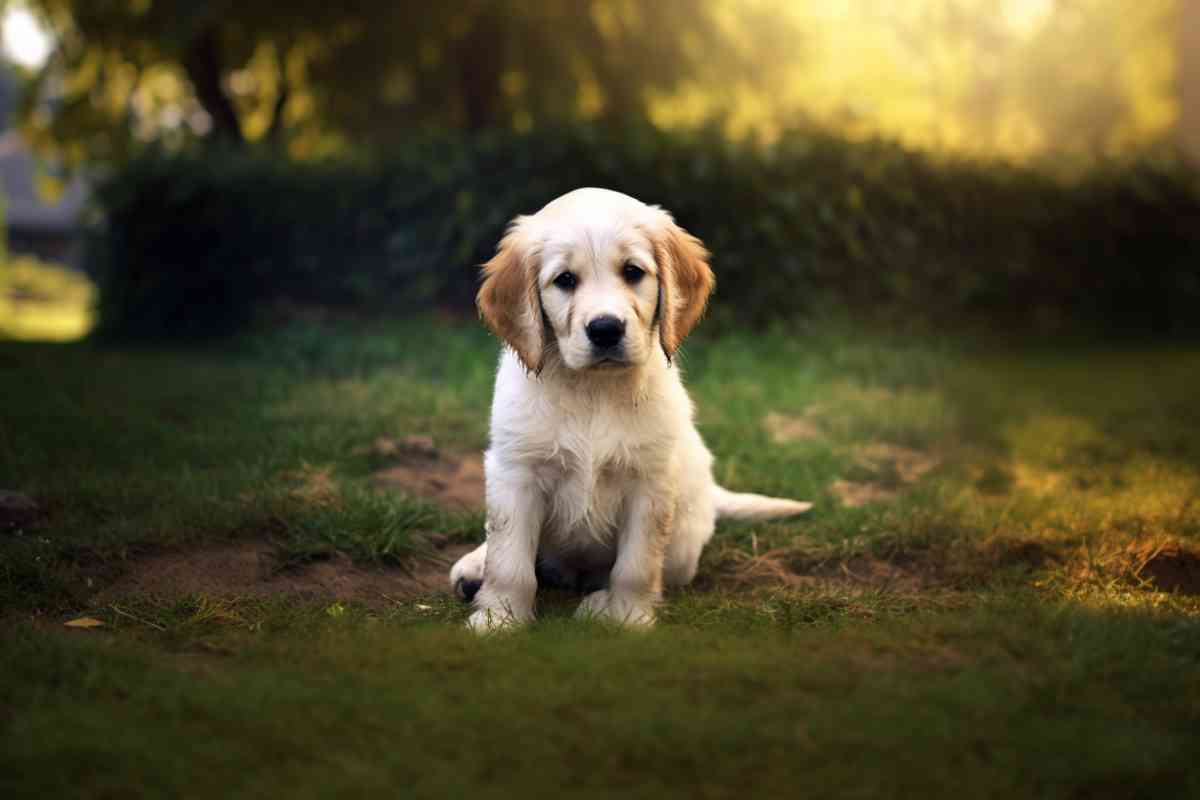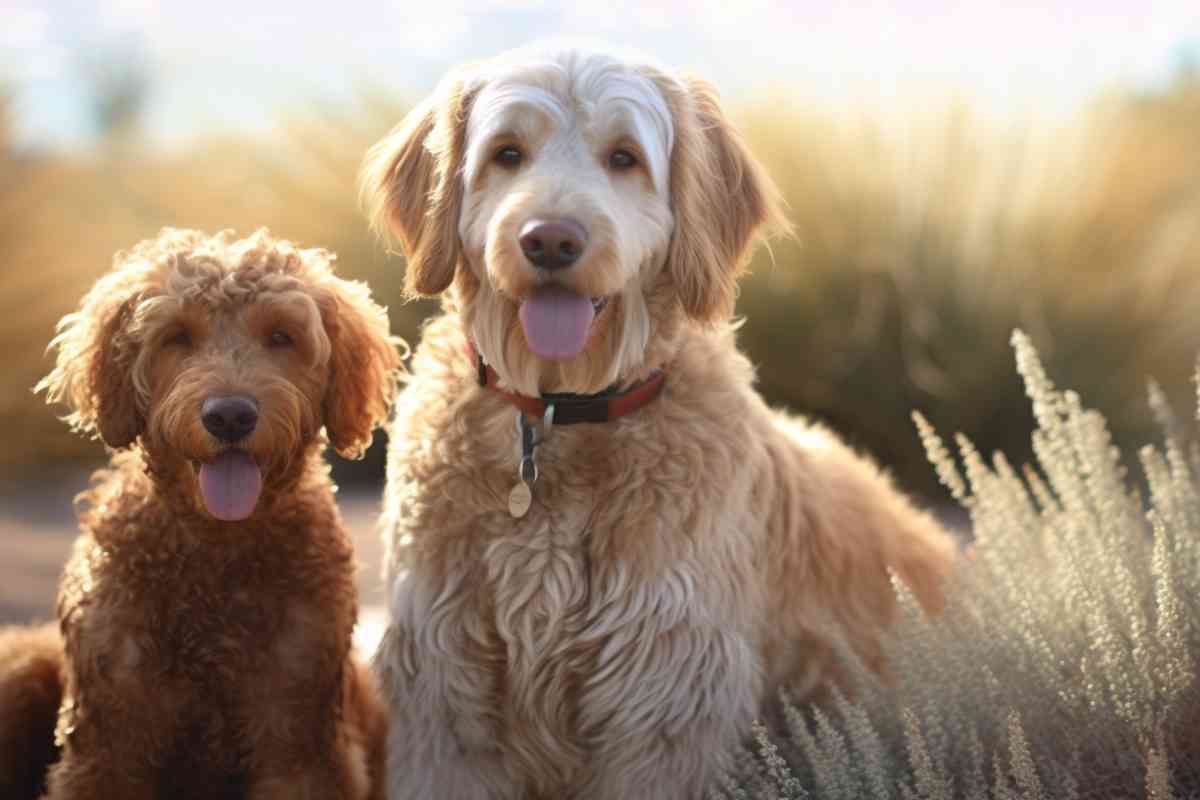Full Grown F1 Goldendoodle: Size, Temperament, and Care Tips
F1 Goldendoodles, a delightful 50/50 mix of Golden Retriever and Poodle, are known for their friendly demeanor, intelligence, and low-shedding coats.
But what does it really mean to share your life with one of these charming canines? Let’s dive in and discover the joys and responsibilities of living with a full-grown F1 Goldendoodle.

Full Grown F1 Goldendoodle: Size, Temperament, and Care Tips
Standard full grown F1 Goldendoodles typically weigh between 50 and 90 pounds and stand about 20 to 26 inches tall. Miniature versions usually weigh between 15 and 35 pounds and stand about 13 to 20 inches tall. F1 Goldendoodles are known for their friendly, outgoing, and highly social nature but they can be prone to separation anxiety. Regular exercise is crucial for these active and energetic dogs. Their coat, ranging from wavy to curly, requires regular brushing to prevent matting and tangling. Early training and socialization are crucial for a well-behaved and confident dog.
Adopting a Full Grown F1 Goldendoodle
This high demand for Goldendoodles often outstrips the supply available for adoption, making it challenging to adopt one.
Here’s why:
High Demand: Goldendoodles are popular for their temperament and hypoallergenic qualities. They’re known to be friendly, intelligent, and great with families, making them highly desirable. As a result, they’re often quickly adopted when they do appear in shelters or rescue groups.
Rescue Groups: Poodles and Poodle mixes, like Goldendoodles, are often quickly taken in by rescue groups from shelters. These groups specialize in caring for specific breeds and finding them suitable homes. They have networks of potential adopters ready and waiting, which means these dogs often don’t stay in the rescue very long.
Geographical Factors: In some cases, dogs are transported to different regions where the demand is higher, and they can be adopted out for higher prices. This is often seen in the movement of dogs from southern states to northern states in the U.S. This practice can make it even more difficult to find a Goldendoodle for adoption locally.
Breeding Practices: Goldendoodles are a designer breed, meaning they’re intentionally bred for certain desirable traits. Because of this, they’re often sold by breeders at a high price, and fewer end up in shelters or rescues compared to other breeds.
If you’re set on adopting a Goldendoodle, patience is key. Regularly check with local shelters and breed-specific rescue groups, and be prepared to wait for the right dog to come along. You can also consider adopting a different breed or a mixed breed dog. There are many wonderful dogs of all types looking for homes, and one of them might be the perfect fit for your family.

F1 Goldendoodle Parent Breeds
The F1 Goldendoodle is a hybrid dog breed that is a cross between a Golden Retriever and a Poodle. Both parent breeds have unique characteristics that make them great family pets.
Golden Retriever
Golden Retrievers are known for their friendly and gentle nature. They are loyal, intelligent, and easy to train. Golden Retrievers are also great with children and make excellent family pets. They are medium to large-sized dogs with a lifespan of 10-12 years.
Poodle
Poodles come in three sizes: Standard, Miniature, and Toy. They are intelligent, active, and trainable. Poodles are also hypoallergenic, making them a great choice for families with allergies. They have a lifespan of 12-15 years. A Standard Poodle can be up to 70 pounds, while toys can be as small as five pounds.
Size and Growth
Goldendoodles are a hybrid breed that comes from a Golden Retriever and a Poodle. The size and growth of a full-grown F1 Goldendoodle can vary depending on the size of the Poodle parent used in the breeding process.
Standard, Mini, and Medium Sizes
Goldendoodles come in three sizes: standard, mini, and medium. Standard Goldendoodles are the largest and can weigh up to 90 pounds and stand up to 24 inches tall. Mini Goldendoodles are the smallest and can weigh up to 30 pounds and stand up to 16 inches tall. Medium Goldendoodles are in between and can weigh up to 45 pounds and stand up to 20 inches tall.
Growth and Adult Size
Goldendoodles typically reach their full size and weight at around 12-18 months of age. However, it is important to note that their growth rate can vary depending on genetics, diet, and exercise.
Below is a size chart that shows the average height and weight of a full-grown F1 Goldendoodle based on their size:
| Size | Height | Weight |
|---|---|---|
| Standard | 22-24 inches | 60-90 pounds |
| Medium | 18-20 inches | 30-45 pounds |
| Mini | 14-16 inches | 15-30 pounds |
Related Posts

Coat and Shedding
The coat of a full-grown F1 Goldendoodle can vary depending on the parents and genetics. However, most Goldendoodles have a curly or wavy coat that can range from short to medium length.
The amount a Goldendoodle sheds, and thus how hypoallergenic they are, can vary. This is largely due to the genetic influence of the Poodle parent, which is known for its hypoallergenic coat. The curlier the Goldendoodle’s coat, the more it resembles the Poodle’s, and the less likely it is to shed significantly or trigger allergies. However, it’s important to remember that no dog breed is truly hypoallergenic, as allergens are present in dog saliva, dander, and urine, not just their fur.
A study published in the American Journal of Rhinology & Allergy found no significant difference in allergen levels in homes with hypoallergenic dogs compared to those with non-hypoallergenic dogs. This suggests that the hypoallergenic status of a dog may not significantly impact the level of allergens in a home environment.
Furthermore, shedding in Goldendoodles can change as they age and mature. Puppies may shed more or less than they will when they are fully grown. It’s also worth noting that regular grooming can help manage shedding and allergen levels in the home.

To maintain the Goldendoodle’s coat, regular grooming is necessary. Brushing their coat at least once a week can help prevent matting and tangling. Using a slicker brush, a comb, and a dematting tool can help keep their coat healthy and shiny. For more information on how to prevent matting and which brushes to use, check out this helpful guide.
When it comes to coat color, the possibilities are endless. Goldendoodles can have a variety of coat colors, including cream, apricot, red, black, and chocolate. Some Goldendoodles even have a parti-color coat, which means their coat is two or more colors.
Temperament and Personality
Full grown F1 Goldendoodles are known for their friendly, playful, and intelligent personalities. They are outgoing, affectionate, and loyal dogs that make great companions for families and individuals alike.
Goldendoodles have a reputation for being easy-going and adaptable, making them a great choice for first-time dog owners. They are known for their sociable nature and love to be around people, making them great family pets. Goldendoodles are also known for their intelligence, which makes them easy to train and quick learners.
One of the most important aspects of a Goldendoodle’s personality is their temperament. Goldendoodles are known for their gentle and patient nature, which makes them great with children and other pets. They are also known for their loyalty, which means they will always be there for their owners and will do anything to protect them.

When it comes to temperament and personality, it’s important to note that each Goldendoodle is unique. While the breed does have some general characteristics, individual Goldendoodles may have their own quirks and personality traits. It’s important to spend time with your Goldendoodle to get to know their personality and temperament so that you can provide them with the best care possible.
| Personality Traits | Description |
|---|---|
| Friendly | Goldendoodles are known for their friendly nature and love to be around people. |
| Playful | Goldendoodles are playful and energetic dogs that love to play and have fun. |
| Intelligent | Goldendoodles are intelligent dogs that are easy to train and quick learners. |
| Outgoing | Goldendoodles have an outgoing nature and love to meet new people and pets. |
| Affectionate | Goldendoodles are affectionate dogs that love to cuddle and be close to their owners. |
| Loyal |

Exercise and Energy Levels
When it comes to exercise and energy levels, full grown F1 Goldendoodles are known to be active and athletic dogs. They require regular exercise to maintain their physical and mental health. Without adequate exercise, they may become bored, restless, and destructive.
The energy level of a full grown F1 Goldendoodle is typically high, and they require a lot of physical activity to burn off their energy. They enjoy running, playing, and going for walks. A daily exercise routine of at least 30 minutes of moderate to vigorous activity is recommended to keep them healthy and happy.
Here is a table that shows the recommended exercise for full grown F1 Goldendoodles based on their weight:
| Weight | Exercise |
|---|---|
| 10-20 lbs | 30 minutes of moderate exercise per day |
| 20-40 lbs | 45 minutes of moderate exercise per day |
| 40-60 lbs | 60 minutes of moderate exercise per day |
| 60-80 lbs | 90 minutes of moderate exercise per day |
It’s important to note that F1 Goldendoodles have different energy levels based on their individual genetics and environment. Some may require more exercise than others, while others may be content with less. It’s important to observe your dog’s behavior and adjust their exercise routine accordingly.
In addition to physical exercise, mental stimulation is also important for full grown F1 Goldendoodles. They enjoy playing games, solving puzzles, and learning new tricks. Incorporating these activities into their daily routine can help keep them mentally sharp and prevent boredom.
Overall, full grown F1 Goldendoodles are active and energetic dogs that require regular exercise to maintain their health and happiness. By providing them with adequate physical and mental stimulation, you can help ensure that they lead a happy and fulfilling life.

Health and Genetics
Golden Retrievers and Poodles, like all breeds, have certain health conditions to which they are predisposed. Let’s take a look at these conditions and discuss what it might mean for F1 Goldendoodles.
Golden Retrievers are known for their friendly and tolerant attitudes. However, they also have certain breed-specific health issues. For instance, a longitudinal study on Golden Retrievers identified major dietary, genetic, and environmental risk factors for cancer and other diseases in this breed.
- Hip Dysplasia: This is a common skeletal condition, often seen in large or giant breed dogs, where the ball and socket joint is malformed. This can lead to pain and limited range of motion.
- Elbow Dysplasia: Similar to hip dysplasia, this condition affects the bones that make up the dog’s elbow joint, leading to pain and limping.
- Heart Diseases: Golden Retrievers are prone to certain heart conditions, such as subvalvular aortic stenosis (SAS), a heart murmur that can lead to more serious complications.
- Cancer: Golden Retrievers have a high incidence of cancer, with the Golden Retriever Lifetime Study aiming to identify the major dietary, genetic, and environmental risk factors for cancer in this breed.
Poodles, on the other hand, are predisposed to these health issues:
- Hip Dysplasia: Like Golden Retrievers, Poodles can also suffer from hip dysplasia.
- Progressive Retinal Atrophy (PRA): This is a family of eye diseases that involves the gradual deterioration of the retina, leading to compromised vision and potentially blindness.
- Addison’s Disease: This condition occurs when the body’s adrenal glands produce insufficient amounts of certain hormones. It can lead to serious symptoms like vomiting, lethargy, and even collapse.
- Sebaceous Adenitis: This is a skin condition that leads to hair loss and can cause secondary skin infections.
So, what does this mean for F1 Goldendoodles? As a crossbreed of Golden Retrievers and Poodles, F1 Goldendoodles could potentially inherit any of these health issues. However, it’s important to note that not all Goldendoodles will get any or all of these diseases. The concept of hybrid vigor suggests that crossbreeds may be healthier than their purebred counterparts.
Moreover, responsible breeding practices can significantly reduce the risk of these health issues. Reputable breeders will screen for these conditions in the parent breeds, reducing the likelihood of passing them on to the puppies. Regular veterinary care, a balanced diet, and a healthy lifestyle can also contribute to a Goldendoodle’s overall health and longevity.
Consider Waiting to Neuter Your Doodle
A study on Poodle health suggests that neutering in the first year of birth may be associated with increased risks of certain health issues. A study on neutering and health found that neutering dogs, including Goldendoodles and Poodles, in the first year after birth might be associated with increased risks of certain health issues.

Hybrid Vigor in F1 Goldendoodles
The concept of hybrid vigor, or heterosis, refers to the phenomenon where the offspring of two different breeds exhibit superior traits compared to their parent breeds. This is particularly observed in traits with low heritability, such as disease resistance and longevity, which are crucial for the overall health and fitness of a dog.
In the case of Goldendoodles, the first cross between a Golden Retriever and a Poodle, known as F1 Goldendoodles, may exhibit this hybrid vigor. This means that F1 Goldendoodles could potentially have improved health, welfare, and fitness compared to their parent breeds.
However, it’s important to note that while studies suggest the possibility of hybrid vigor in dogs, more specific research is needed to confirm its existence and extent in Goldendoodles. As such, while the concept of hybrid vigor provides a promising perspective on the health benefits of crossbreeds like Goldendoodles, it’s essential to consult with breeders and veterinarians to understand the specific traits and health conditions of individual dogs.
Breed Standards and Variations
The Goldendoodle is not a recognized breed by the American Kennel Club (AKC). However, the Goldendoodle Association of North America (GANA) has established breed standards for Goldendoodles. According to GANA, a Goldendoodle is a hybrid cross between a Golden Retriever and a Poodle. The F1 Goldendoodle is the first-generation cross, where one parent is a purebred Golden Retriever and the other is a purebred Poodle.
The breed standard for a Goldendoodle varies depending on the size and coat type. GANA recognizes four sizes of Goldendoodles: Petite (10-25 pounds), Miniature (25-40 pounds), Medium (40-55 pounds), and Standard (55-90 pounds). The coat type can be curly, wavy, or straight. The color can vary from cream to red, with some having white markings.
The Goldendoodle breed standard includes temperament, health, and appearance. Goldendoodles should be friendly, sociable, and trainable. They should not show any signs of aggression or shyness. Health-wise, Goldendoodles should be screened for hip dysplasia, elbow dysplasia, and eye diseases. They should also be up-to-date on their vaccinations and receive regular veterinary check-ups.

In terms of appearance, Goldendoodles should have a well-proportioned body, with a broad head and a gentle expression. The coat should be dense, non-shedding, and allergy-friendly. The Goldendoodle coat can vary depending on the generation and the parents’ coat type. For example, an F1B Goldendoodle is a second-generation cross, where an F1 Goldendoodle is bred back to a Poodle. This cross produces a more curly, non-shedding coat.
While there are breed standards for Goldendoodles, there can be variations in size, coat type, and color. Some breeders may breed for specific characteristics, such as a smaller size or a particular coat color. It is essential to research and find a reputable breeder who follows GANA’s breed standards and performs health screenings on their breeding dogs.
| Size | Weight Range | Height Range |
|---|---|---|
| Petite | 10-25 pounds | 10-14 inches |
| Miniature | 25-40 pounds | 14-17 inches |
| Medium | 40-55 pounds | 18-21 inches |
| Standard | 55-90 pounds | 22-26 inches |
Overall, the Goldendoodle is a popular hybrid crossbreed with a friendly disposition and a low-shedding coat. While there may be variations in size and coat type, it is essential to find a breeder who follows GANA’s breed standards and performs health screenings on their breeding dogs to ensure a happy and healthy Goldendoodle.
Choosing a Breeder
Choosing a reputable breeder is essential when looking for a full grown F1 Goldendoodle. A reputable breeder will be knowledgeable about the breeding process, genetics, and health issues that could affect the puppies. They will also be able to provide references and have a history of producing healthy and well-socialized puppies.

When searching for a breeder, it is important to do your research and ask questions. Look for breeders who are members of recognized breeding associations and who follow their guidelines for breeding practices. Ask to see health certifications for both the parents and the puppies, including hip and elbow dysplasia, eye and heart clearances, and genetic testing.
Here is a table to illustrate some questions you may want to ask a breeder before purchasing a full grown F1 Goldendoodle:
| Question | What to Look for |
|---|---|
| Are you a member of any recognized breeding associations? | A reputable breeder will likely be a member of recognized breeding associations and will follow their guidelines for breeding practices. |
| Can I see health certifications for both the parents and the puppies? | A reputable breeder will have health certifications for both the parents and the puppies, including hip and elbow dysplasia, eye and heart clearances, and genetic testing. |
| What kind of socialization and training do you provide for the puppies? | A reputable breeder will provide socialization and training for the puppies to ensure that they are well-adjusted and well-behaved. |
| Can you provide references from previous customers? | A reputable breeder will be able to provide references from previous customers who have purchased puppies from them. |
In addition to asking questions, it is important to visit the breeder in person and see the living conditions of the puppies and the parents. A reputable breeder will have clean and spacious living conditions for the dogs and will allow you to interact with the puppies and the parents.
Choosing a reputable breeder is a crucial step in finding a healthy and well-socialized full grown F1 Goldendoodle. By doing your research, asking questions, and visiting the breeder in person, you can ensure that you are getting a puppy from a breeder who cares about the health and well-being of their dogs.

Frequently Asked Questions
What is the difference between F1 and F1B Goldendoodles?
F1 Goldendoodles are a first-generation cross between a purebred Golden Retriever and a purebred Poodle, while F1B Goldendoodles are a cross between an F1 Goldendoodle and a purebred Poodle. This means that F1B Goldendoodles are 75% Poodle and 25% Golden Retriever, while F1 Goldendoodles are 50% Poodle and 50% Golden Retriever. F1B Goldendoodles are typically more hypoallergenic than F1 Goldendoodles because they have a higher percentage of Poodle genes.
What is the typical lifespan of a full grown F1 Goldendoodle?
The typical lifespan of a full grown F1 Goldendoodle is between 10 and 15 years. However, this can vary depending on factors such as genetics, diet, exercise, and overall health.
What is the average size of a full grown Goldendoodle?
The average size of a full grown Goldendoodle can vary depending on whether it is an F1 or F1B Goldendoodle, as well as the size of the Poodle used in the cross. Generally, F1 Goldendoodles can range in size from 45 to 90 pounds and stand 20 to 24 inches tall at the shoulder. F1B Goldendoodles can range in size from 35 to 50 pounds and stand 18 to 20 inches tall at the shoulder.
What is the temperament of an F1 Goldendoodle?
F1 Goldendoodles are known for being friendly, affectionate, and intelligent. They are great family pets and get along well with children and other animals. They are also known for being easy to train and eager to please.
Where can I find reputable F1 Goldendoodle breeders?
It is important to do your research and find a reputable breeder when looking for an F1 Goldendoodle. You can start by checking with the Golden Retriever and Poodle breed clubs in your area, as well as searching online for breeders who specialize in Goldendoodles. Be sure to ask for references and visit the breeder in person to ensure that they are reputable and that their dogs are well-cared for.
How long do F1 Goldendoodles usually live?
F1 Goldendoodles usually live between 10 and 15 years, depending on factors such as genetics, diet, exercise, and overall health. It is important to provide your F1 Goldendoodle with proper care and regular veterinary check-ups to ensure a long and healthy life.
| Question | Answer |
|---|---|
| What is the difference between F1 and F1B Goldendoodles? | F1 Goldendoodles are a first-generation cross between a purebred Golden Retriever and a purebred Poodle, while F1B Goldendoodles are a cross between an F1 Goldendoodle and a purebred Poodle. |
| What is the typical lifespan of a full grown F1 Goldendoodle? | The typical lifespan of a full grown F1 Goldendoodle is between 10 and 15 years. |
| What is the average size of a full grown Goldendoodle? | The average size of a full grown Goldendoodle can vary depending on whether it is an F1 or F1B Goldendoodle, as well as the size of the Poodle used in the cross. |
| What is the temperament of an F1 Goldendoodle? | F1 Goldendoodles are known for being friendly, affectionate, and intelligent. |
| Where can I find reputable F1 Goldendoodle breeders? | You can start by checking with the Golden Retriever and Poodle breed clubs in your area, as well as searching online for breeders who specialize in Goldendoodles. |
| How long do F1 Goldendoodles usually live? | F1 Goldendoodles usually live between 10 and 15 years, depending on factors such as genetics, diet, exercise, and overall health. |